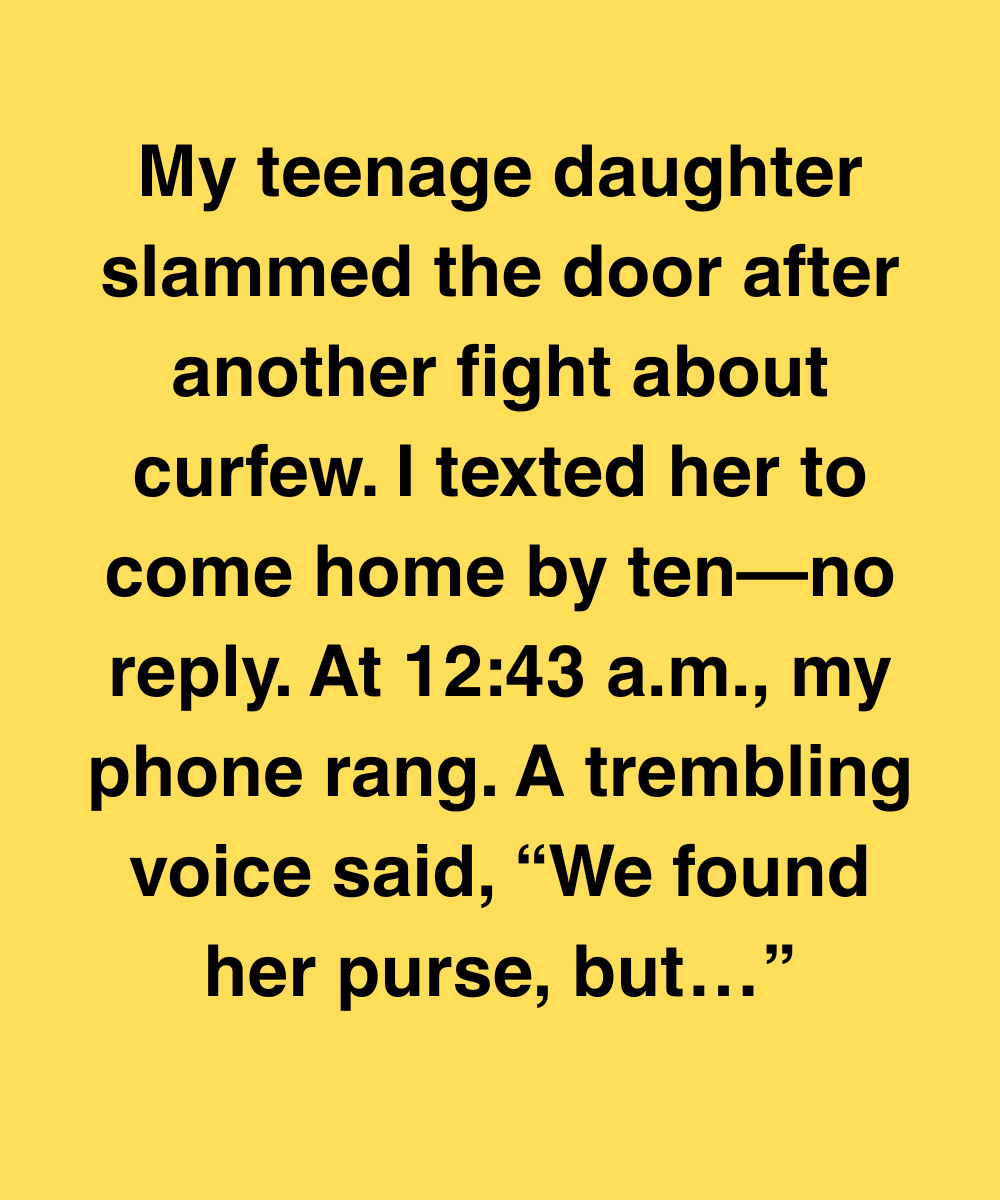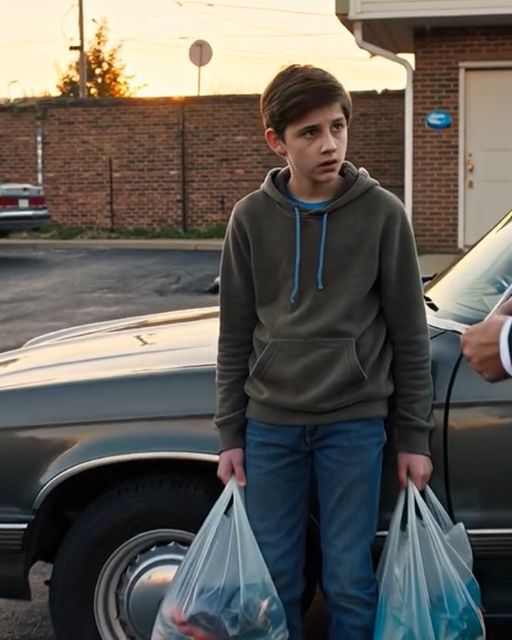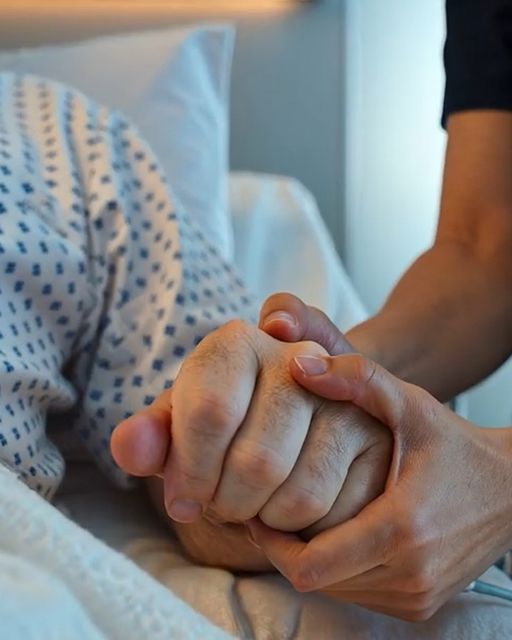My teenage daughter slammed the door after another fight about curfew. I texted her to come home by ten—no reply. At 12:43 a.m., my phone rang. A trembling voice said, “We found her purse, but…”
That sentence still echoes in my ears.
I remember fumbling to sit up, my heart already sprinting before the woman even finished. She was a waitress at a 24-hour diner near the freeway. Said she found a purse in the parking lot, behind the building, stuffed halfway under a bush. My daughter’s school ID was inside. No wallet. No phone.
I threw on whatever I could find—sweatpants, a hoodie—and drove there on instinct. Didn’t even lock the door behind me. My husband, Ajay, was working a night shift at the hospital. I left a voicemail in a panic but didn’t wait. Every red light felt like a threat.
When I pulled into the lot, there was already a patrol car parked crookedly near the dumpster. The purse was in an evidence bag. The waitress, a tired-looking woman with messy hair in a hairnet, kept wringing her hands.
“I didn’t see her,” she said. “But there was a guy… he was here earlier, arguing with someone in a blue hoodie.”
My daughter, Priya, had been wearing her favorite blue hoodie when she left the house.
The officer said they’d do a sweep, contact her friends, check the diner cameras. But I knew how these things go—missing kids are considered runaways until proven otherwise.
“She’s seventeen,” I kept saying. “She’s smart. She wouldn’t just… leave her bag.”
But what rattled me most? I couldn’t shake that last text I’d sent her.
“Be home by 10 or don’t come home at all.”
For days, that sentence swallowed me whole.
The next morning, we filed a report. Her photo—big brown eyes, nose ring she snuck past us for a whole month—got printed on flyers. Ajay took leave from work. I stopped eating. The only thing I could stomach was weak tea and guilt.
We went through her room. Her laptop was still there. A half-eaten granola bar, her sketchpad with half-drawn faces, some full of rage, some almost serene. She hadn’t taken her charger. Or her toothbrush.
Her best friend, Anika, came by the day after. Pale. Shaky. Claimed she hadn’t heard from Priya since earlier that afternoon.
“She was mad,” she whispered. “But not, like… crazy mad. Just normal mad. She didn’t say where she was going.”
I believed her. For a while.
The cops kept updating us with dead ends. The camera footage was grainy. Just a dark figure near the dumpsters around midnight. No clear face. No license plate. They called in missing persons, did a local search, but the trail ran cold fast.
I tried to keep going. I still made dinner every night even though no one really ate. Kept lighting a candle by the window, like some kind of makeshift lighthouse. People from the neighborhood came by with casseroles and prayers. But no leads.
Three weeks in, something cracked.
Ajay came home from one of the volunteer searches furious.
“I found out Anika’s been lying,” he said. “One of the other kids saw them together the night she disappeared. At the diner.”
That hit like a slap.
We invited Anika over again. I didn’t accuse her straight away. Just made chai. Asked how she was sleeping. Then slid the question in: “What did you two order that night at the diner?”
She flinched. Then blinked.
“I… I don’t remember,” she stammered.
“I thought you said you weren’t with her that night,” I replied quietly.
She burst into tears.
It came out slowly. Apparently, Priya had met up with Anika that night after storming out. They went to the diner, split fries, vented about parents and rules. Then—this is where it turned—some guy showed up. Anika didn’t know him well. Said Priya had been texting him for a few weeks. A guy from another school, maybe a college freshman. Name started with “D.”
“She said he was just gonna give her a ride home,” Anika sobbed. “I begged her to wait. But she said it was fine. He’d done it before.”
That was the first time I realized how much I didn’t know about my daughter’s online life.
We handed everything to the detectives. They pulled her phone records, traced the last few numbers. The texts were deleted, but they recovered a few from her cloud backup. Flirty, but cautious. He called himself “Dev.” No last name. No photos.
It took another week to trace a burner number to a prepaid phone purchased at a 7-Eleven thirty miles away. The cameras caught a guy in a baseball cap paying cash. No face. Just broad shoulders and a nervous energy.
Still, it gave the investigation new life.
They released a photo of the man, grainy but just enough to catch someone’s eye. And someone did.
A clerk from a vape shop in Arlington called in. Said the guy looked like someone who used to hang around—older, creepy, tried to flirt with the high school girls. Drove a red Civic with a dent in the side.
That’s when things moved fast.
The police found the car abandoned near a motel in Virginia. Inside, they found a hoodie. Priya’s sketchbook. And a receipt from a gas station dated four days after she went missing.
Which meant—she might still be alive.
The motel had been paid for in cash, but the guest log had a fake name. The manager remembered “Dev”—said he stayed there for a few nights, came back with a girl once. Seemed on edge.
They ran DNA on the items. Confirmed she’d been there. My baby had been alive. But gone.
The motel was already vacated when the police got there. No sign of either of them.
The next two months were hell. I stopped waiting by the window. It hurt too much. But I never stopped hoping.
Then came the twist none of us expected.
One morning in mid-April, my husband’s cousin in Maryland texted: “Is this Priya?”
He attached a screenshot of a blurry video from a mutual friend’s Instagram story. A silent pan of a college party in Baltimore. Music blaring, plastic cups everywhere. And in the corner, for half a second—someone who looked just like her.
I stared at the image for five minutes. Zoomed in. Zoomed out. My heart galloping like it wanted to leap out of my chest.
We sent it to the police. They couldn’t confirm with just a grainy frame. But they did a location check. Started interviewing students in that area.
A freshman named Rachelle came forward. Said a girl named “Pri” had been crashing in her dorm suite for a few days. Didn’t go to the school. Said she was “figuring stuff out.”
By the time they checked the room, she was gone.
But Rachelle had something—she’d snapped a selfie with “Pri” the day before. This one was clear.
It was her.
Wearing someone else’s clothes. But those eyes. That lopsided grin. That nose ring.
She was alive.
I collapsed on the floor. Just wept.
We didn’t know where she’d gone next. But it gave the case a whole new angle. This wasn’t just a disappearance. It was a runaway. A calculated one.
Anika, bless her, felt horrible. But I told her: “You’re just a kid too. We all missed something.”
Turns out, Priya had finally had enough. The guy—“Dev”—was real. But she ditched him after two days at the motel. Said he made her feel suffocated. So she waited till he went out for food, took a bus, and vanished again.
She didn’t call. Didn’t come home. Because in her mind, home meant rules and fights and pressure.
She lived out of a backpack for weeks. Couch-hopped. Drew portraits for cash. Ate cereal for dinner. She found little pockets of kindness from strangers who didn’t ask too many questions.
But it wore her down. The freedom she’d dreamed of came with a weight she hadn’t expected.
Then, finally—out of the blue—she called me.
Three months and seventeen days after that night, my phone buzzed.
Her name flashed on screen. I almost didn’t believe it.
“Ma,” she whispered, voice hoarse. “Can I come home?”
We met her at a drop-in center for youth in Baltimore. She looked thinner. Wiser. Eyes tired, but still hers.
I didn’t ask questions. Just held her. Let her cry into my shoulder. Let her be seventeen again.
The drive home was quiet. Ajay kept his hand on her knee the whole way. She kept looking out the window, like she couldn’t believe we were real.
We didn’t ground her. Didn’t scold. Not right away.
We just let her be.
Later, over tea and leftovers, she told us everything.
How it started as a rebellion. Then survival. Then regret. How she tried to call once but heard my voicemail and panicked. How ashamed she felt. How much she missed her bed.
“I thought you’d hate me,” she said.
“Hate you?” I whispered. “I died every day you were gone.”
We went to therapy. As a family. We stopped yelling. Started listening. She started drawing again. Took summer classes. Cut off every toxic number in her phone.
Anika and she are still friends, though not as close. Sometimes people grow apart after growing up too fast.
The guy—Dev—was eventually found and arrested. Turns out he had a record. Suspended sentence in another state. He’s not getting out anytime soon.
But I don’t dwell on him.
I dwell on the day Priya came home.
The day she chose healing over hiding.
If there’s anything I’ve learned, it’s this:
Sometimes our kids don’t need stricter rules. They need softer landings.
They need to know that home isn’t just a place with curfews—it’s where love outshouts fear.
If this touched you, share it. You never know who needs the reminder that it’s never too late to come home. 💛




